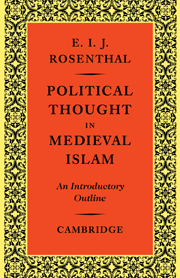Book contents
- Frontmatter
- Contents
- AUTHOR'S NOTE
- ABBREVIATIONS
- INTRODUCTION
- PART I CONSTITUTIONAL LAW AND MUSLIM HISTORY
- I THE QUEST FOR HAPPINESS
- II THE CALIPHATE: THEORY AND FUNCTION
- III GOVERNMENT
- IV THE THEORY OF THE POWER-STATE: IBN KHALDŪN'S STUDY OF CIVILIZATION
- PART II THE PLATONIC LEGACY
- APPENDIX: SOME TURKISH VIEWS ON POLITICS
- NOTES
- GLOSSARY
- INDEX
I - THE QUEST FOR HAPPINESS
Published online by Cambridge University Press: 07 May 2010
- Frontmatter
- Contents
- AUTHOR'S NOTE
- ABBREVIATIONS
- INTRODUCTION
- PART I CONSTITUTIONAL LAW AND MUSLIM HISTORY
- I THE QUEST FOR HAPPINESS
- II THE CALIPHATE: THEORY AND FUNCTION
- III GOVERNMENT
- IV THE THEORY OF THE POWER-STATE: IBN KHALDŪN'S STUDY OF CIVILIZATION
- PART II THE PLATONIC LEGACY
- APPENDIX: SOME TURKISH VIEWS ON POLITICS
- NOTES
- GLOSSARY
- INDEX
Summary
THE MEDIEVAL ATTITUDE
Politics, Plato's royal art, is defined by Aristotle in his Nicomachean Ethics as “the most authoritative of the sciences” and its object as the supreme good which man desires for its own sake. This good is equated with happiness as the result of action, and though men differ in their desires and their objects, such as pleasure, honour or the life of contemplation, according to their lights, they all seek the highest good in their quest for happiness. Ordinary men seek pleasure or honour for their own sakes, but also for the sake of happiness. This view of Aristotle's became the common property of the Middle Ages. Yet the philosopher aims at practical or moral and theoretical or intellectual perfection. That perfection is happiness par excellence.
Medieval thinkers, Muslim, Jewish and Christian alike, conceived of this happiness in relation to God, and for them its consummation consisted in the love of God. They were, with few exceptions, concerned not so much with the individual and his perfection but rather with the group, the religious society in the state governed by divine law. They agree with Aristotle that “the good of the state is manifestly a greater and more perfect good”. But by giving the highest good a religious content by relating it to the God of revelation in the form of law, they transformed the merely metaphysical concept of their teacher into a religious value.
- Type
- Chapter
- Information
- Political Thought in Medieval IslamAn Introductory Outline, pp. 13 - 20Publisher: Cambridge University PressPrint publication year: 1958



